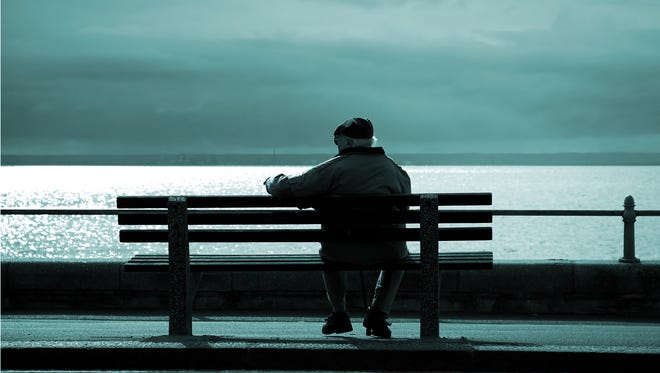Nobody likes to admit being lonely, but you should

Loneliness is upsetting, unwanted and often misunderstood. It's also something we don't talk about enough.
Fear of being stigmatized prevents many from even admitting an issue. And that can prove deadly.
“Nobody wants to say, ‘Hey, I’m lonely,’” says Charlotte Yeh, chief medical officer of AARP Services. Yet if unaddressed, loneliness can have dire consequence.
"Loneliness has a powerful impact on your health, your behavior, your sense of well-being," Yeh says.
There is a 26% increased likelihood of death for those who feel lonely and 29% for those who have actual social isolation, according to a Brigham Young University study released in 2015.
More: Why do we feel so lonely all the time?
On Thursday, study author and BYU psychology and neuroscience professor Julianne Holt-Lunstad stressed the importance of social connections during a U.S. Senate Special Committee on Aging hearing on the consequences of isolation and loneliness.
BYU professor and study co-author Tim Smith said in a past statement: "Not only are we at the highest recorded rate of living alone across the entire century, but we're at the highest recorded rates ever on the planet."
"With loneliness on the rise, we are predicting a possible loneliness epidemic in the future," he said.
Research has found:
- The health risks of feeling lonely, as well as actual social isolation, surpass those associated with obesity (BYU).
- Lacking social connections can be as damaging to health as being an alcoholic or smoking up to 15 cigarettes a day (BYU).
- Chronic loneliness can increase the chances of high blood pressure (per University of Chicago studies).
- Loneliness is a risk factor for cognitive decline (University of Chicago).
- Loneliness and social isolation are risk factors for coronary heart disease and stroke (BYU).
"Isolation and loneliness are associated with higher rates of heart disease, a weakened immune system, more depression and anxiety, dementia including Alzheimer’s disease and nursing home admissions," Sen. Susan Collins, R-Maine, said during the Senate hearing.
A few months ago, Rice University researchers said study participants who reported being lonely said they had more severe symptoms than others who also got sick through cold-inducing nasal drops.
"Lonely people typically have elevated inflammatory responses. That could be part of the story," said Chris Fagundes, a Rice psychology professor and study co-author. "They are also less likely to perceive support from others in times of stress."
Overworked? Join the club. Here's how to handle it
The reason that cold is so bad: You're lonely
"Elder orphans" band together for support and advice
Other research has found that loneliness and social isolation are associated with behaviors such as smoking, lack of physical exercise and poor sleep, as well as with poorer immune functioning and elevated cortisol, among other issues.
Loneliness "can feel devastating," says Jennifer Caudle, an osteopathic family physician and assistant professor at Rowan University School of Osteopathic Medicine. The more we openly talk about it, the more likely we are to come up with solutions, she says.
She encourages those who feel overwhelmed to talk with their doctors about the issue.
"If you are worried about how you feel and you can’t conquer this on your own, that’s your signal to reach out for help," she says. "If you feel lonely, it’s OK. You are not alone. And there are things that we can do about this."
Other resources:
- Call the National Alliance on Mental Illness Helpline: 800-950-NAMI or text "NAMI" to 741741.
- Visit AARP's Connect2Affect.org, which is designed to build awareness about social isolation.
- Psychology Today offers these tips on addressing loneliness.
Contributing: Sean Rossman, USA TODAY